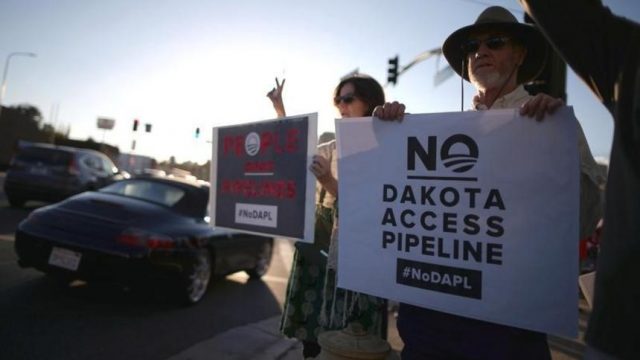The Regulatory Process Is Not the Proper Place for Anti-Pipeline Activism

Protesters demonstrate against the Energy Transfer Partners' Dakota Access oil pipeline near the Standing Rock Sioux reservation, in Los Angeles, California, September 13, 2016. REUTERS/Lucy Nicholson
The Obama administration is working with the Standing Rock Sioux and other Native American tribes to facilitate better communication on infrastructure construction projects like pipelines. That’s going to be on the agenda of a Tribal Nations Conference at the White House next week.
That’s not at all an unreasonable goal. Native Americans have a significant interest in these projects – from protecting culturally significant areas to ensuring that the pipelines are environmentally safe – though in the context of the Dakota Access pipeline the Standing Rock tribe is trying to block it seems a little hypocritical.
After all, as federal Judge James Boasberg detailed, the tribe was uncooperative when it came to setting up meetings on that project. Also, the tribe didn’t bother showing up to a single hearing held by the North Dakota Public Service Commission on the project.
Still, if there is a better process for including tribal voices in the regulatory process around pipelines, I’m in favor of finding it so that future projects can be built with less rancor than the Dakota Access line has drawn.
[mks_pullquote align=”right” width=”300″ size=”24″ bg_color=”#ffffff” txt_color=”#000000″]…what these groups shouldn’t get is a heckler’s veto in a process that was intended to facilitate the construction of safe, responsible infrastructure.[/mks_pullquote]
But here’s a question: How seriously should we take this push for greater consultation on pipelines when tribes like Standing Rock only want to give a “no” answer?
Because even as Standing Rock says they want to be consulted on pipelines, they’ve signed onto an agreement with other North American tribes to block all pipelines.
This seems disingenuous on the part of Standing Rock and the other tribes.
The whole point of the regulatory/permitting process around pipelines is to ensure that they are built safely and along routes that are respectful of culturally significant and/or environmentally sensitive areas. Yet the tribes and the environmental extremists they’re working with have made it clear that they want to use the regulatory process to block pipelines.
They don’t so much want to improve the process through which we build pipelines as eradicate that process entirely.
That’s ridiculous.
If these groups want to work to block pipelines and oil production, then fine. They have the same rights to engage in the democratic process as the rest of us, however zany their goals. Let them lobby our lawmakers to make oil, and the transportation of oil, illegal. I suspect they won’t get very far because Americans would have to take a very significant hit to the quality of their lives if they were robbed of all the goods and services oil makes possible, but whatever.
We’re all free to choose the windmills we tilt at.
But what these groups shouldn’t get is a heckler’s veto in a process that was intended to facilitate the construction of safe, responsible infrastructure.




